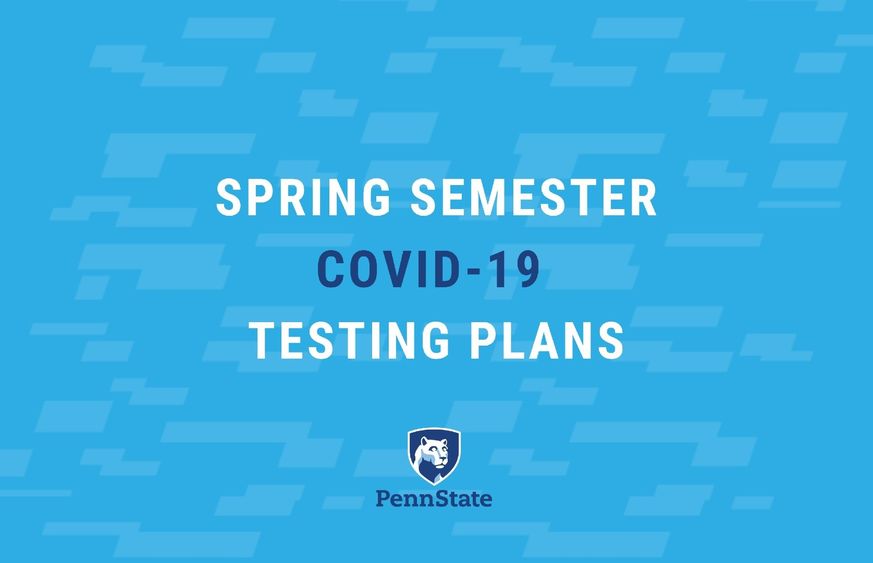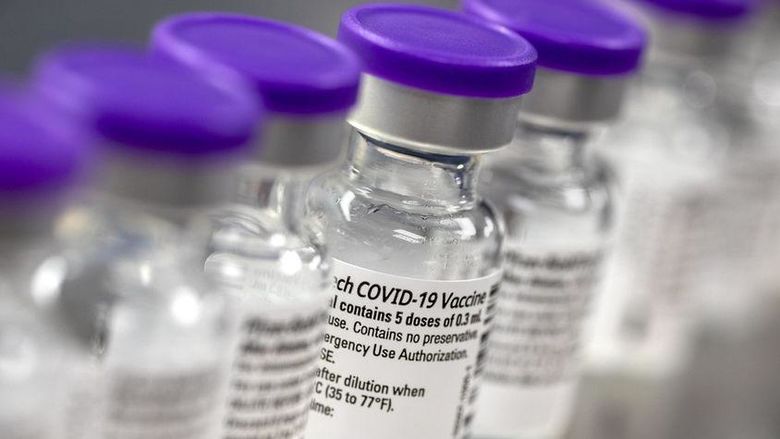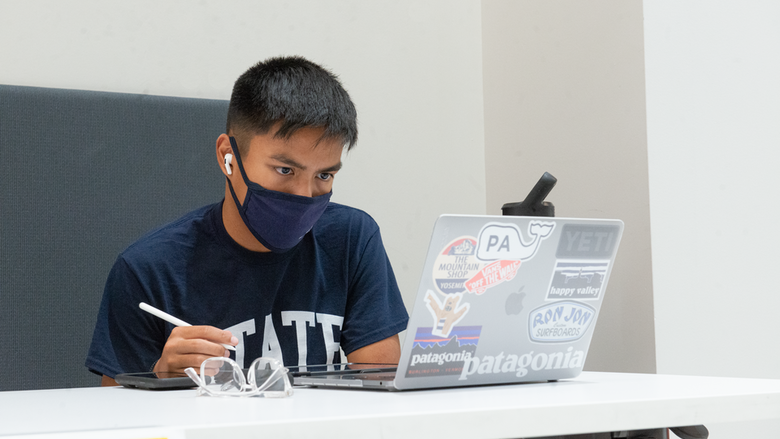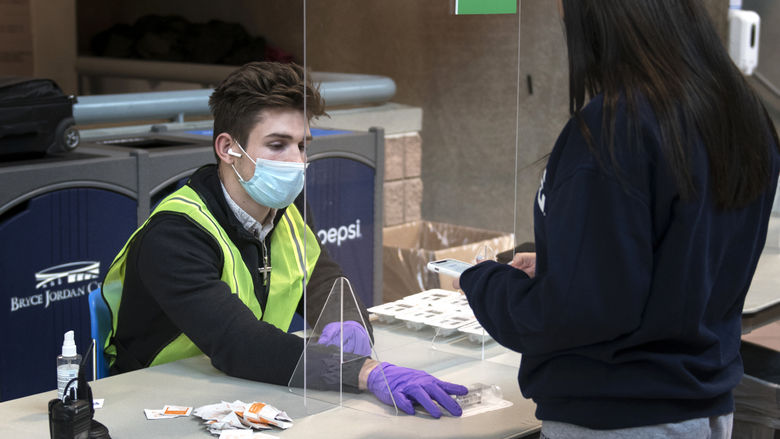
UNIVERSITY PARK, Pa. – Penn State has developed a comprehensive spring 2021 COVID-19 testing strategy for all campuses that includes both required and voluntary testing during the remote learning period and the in-person portion of the spring semester.
The University’s spring 2021 testing strategy is designed to be flexible to allow the University to pivot and adjust the plan as circumstances change. The plan is divided into eight categories (click on each testing category for more information). Readers can also find more information about testing on the University’s official coronavirus information website.
Remote-period testing:
- Required testing for students living on campus during the remote period
- Opt-in remote period testing
Required testing:
- Required initial testing prior to in-person learning
- Required testing during the first two weeks of in-person learning
Semester-long testing:
"...it will take our entire community – students, faculty and staff – working together and taking proper health precautions to be successful in our efforts to maintain in-person activities.”—Penn State President Eric J. Barron
“The spring semester testing strategy is built on the testing plan we implemented in the fall, but we have expanded it based on what we learned in the fall semester and changes we made as we responded to the pandemic," said Penn State President Eric J. Barron "While the pandemic remains complex and ever-changing, our augmented and extensive approach to testing will help us to mitigate spread and keep our campuses and local communities as safe as possible. Still, it will take our entire community – students, faculty and staff – working together and taking proper health precautions to be successful in our efforts to maintain in-person activities.”
Remote-period testing
Required testing for students living on campus during the remote period
Until Feb. 12, students who continue living in campus residence halls are required to have weekly COVID-19 testing. All students living on Penn State campuses will receive a weekly email reminding them of this required testing with instructions on how to obtain a test.
- At University Park, the testing location is the Hintz Family Alumni Center.
- At Penn State Altoona, Behrend and Harrisburg, tests will be distributed on campus.
- At all other Commonwealth Campuses, tests will be ordered through the mail.
Opt-in remote period testing
Regular use of voluntary testing is strongly encouraged for any student living near a Penn State campus during the remote portion of the semester.
- At University Park, walk-up testing will be available at the Hintz Family Alumni Center for all students — living either on or off campus — from 10 a.m. to 5 p.m. on Mondays, Tuesdays, Wednesdays and Fridays through Feb. 12.
- At Penn State Altoona, Behrend and Harrisburg, tests will be distributed on campus.
- At all other Commonwealth Campuses, tests will be ordered through the mail.
- Employees listed in the University’s Return to Work database may order a Vault Health mail-in test kit.
University Park employees in the University’s Return to Work database may also utilize the walk-up testing. However, they are strongly encouraged to use the at-home, mail-in test kits when possible.
Required testing
Required initial testing prior to in-person learning
All students from all campuses, including those who are fully remote or online and live in Centre County or within a 20-mile radius of a Penn State campus, are required to participate in COVID-19 testing and have a negative test result from a University-provided test on file prior to their return to their campus community — this includes students who remained in their campus community after fall semester and throughout winter break. The test results must be received within the 72 hours prior to the students’ return to their campus. A negative result from a third-party test will not be accepted. Students who have tested positive for COVID-19 within the previous 90 days of their arrival are exempted from the required initial testing. Positive PCR test results can be uploaded in the “Know Your Status” Portal. Positive antigen tests are not accepted.
Students must log in to the “Know Your Status” Portal to start the required initial testing process.
Universal required testing during the first two weeks of in-person learning
During the first two weeks of in-person learning (Feb. 15 to Feb. 26), the University will conduct universal COVID-19 testing of all students who are taking in-person classes or who are taking a fully remote or online course load while living in Centre County or within a 20-mile radius of a Penn State campus.
Students should be on the lookout for an email sent to their Penn State email address to register for a time to get tested.
At University Park, the tests will be administered seven days a week in room 126 of the White Building. Testing site details at other Penn State campuses will be communicated directly to students.
Students who test positive will be referred to isolation and the University’s contact tracing process will be initiated.
Semester-long testing
Symptomatic testing throughout the spring semester
Throughout both the remote and in-person periods, students who are experiencing symptoms of COVID-19 should seek out symptomatic testing through a University health care provider.
- At University Park, students living on campus or in the local community who are exhibiting symptoms of COVID-19 should schedule testing appointments with University Health Services (UHS) via myUHS. UHS’s hours of operation are available on the UHS website.
- Students living on or near other Penn State campuses should seek symptomatic testing via their campus’ health services or a local provider.
- Students who exhibit COVID-19 symptoms while at home during the remote learning period should consult a local health care provider. If positive, students living at home during the remote learning period should self-isolate in accordance with all Centers for Disease Control and Prevention and Pennsylvania Department of Health guidelines.
Walk-up and mail-in testing throughout the semester
When in-person classes resume at University Park, walk-up testing will be available at the Hintz Alumni Center from 9 a.m. to 5 p.m. Monday through Saturday.
Walk-up testing is available for students who are identified in the University’s contact tracing process or who believe they may have been in close contact with an individual who tested positive for COVID-19. Students who test positive will be referred to isolation and the University’s contact tracing process will be initiated.
University Park employees who are listed in the University’s Return to Work database may also utilize the walk-up testing. However, they are strongly encouraged to order a Vault Health mail-in test kit, when possible. Employees who opt to use walk-up testing will receive a PCR test initially, not a rapid antigen test.
At the Commonwealth Campuses, testing processes are defined for each campus and are typically administered by the local health center or other designated area. Specific details and hours can be obtained on campus through the campus Student Affairs office.
Opt-in testing remains available for Commonwealth Campus employees who are listed in the University’s Return to Work database via a Vault Health mail-in test kit.
Daily random surveillance testing
Beginning March 1 (at the conclusion of the Universal required testing during the first two weeks of in-person learning), the University will conduct random daily surveillance testing of approximately 2% of the University’s population of students and employees living, learning or working on campus as well as those who access campus. This includes all employees who are working on campus and students who are taking in-person classes or living within 20 miles of a campus. Students and employees who are randomly selected to participate in surveillance testing are required to complete a COVID-19 test, with a few exceptions.
Surveillance testing will be conducted using PCR tests. At University Park, surveillance testing will be conducted at the Mount Nittany Club in Beaver Stadium and at 101 North Atherton St., the former FedEx Office (Kinko’s) building located at the corner of North Atherton Street and West College Avenue.
At the Commonwealth Campuses, surveillance testing for both employees and students will be conducted either through Vault Health mail-in tests, or through Vault Health tests distributed on campus. Locations on other Penn State campuses will vary and will be communicated directly to those selected to participate in surveillance testing.
“We all need to do our part to help, and that includes participating in the random surveillance testing when you are selected to do so."—Kelly Wolgast , director, COVID-19 Operations Control Center
“Our surveillance testing program is key to gauging the prevalence of the virus on our campus and to minimizing spread,” said Kelly Wolgast, director of the University’s COVID-19 Operations Control Center. “We all need to do our part to help, and that includes participating in the random surveillance testing when you are selected to do so. This data is vital in our efforts to maintain on-campus activities as safely as we can.”
Quarantine testing
Asymptomatic students who are quarantining because they have been identified through contact tracing as a close contact of an individual who tested positive for COVID-19 will be able to receive a COVID-19 test during day 5-7 of their quarantine. Per guidance from the Centers for Disease Control and Prevention, asymptomatic students with a negative test on or after day five of quarantine will be permitted to end their quarantine after seven days. Instructions for testing will be communicated directly to quarantined students.
More information on testing is available on the University’s official coronavirus information website.


